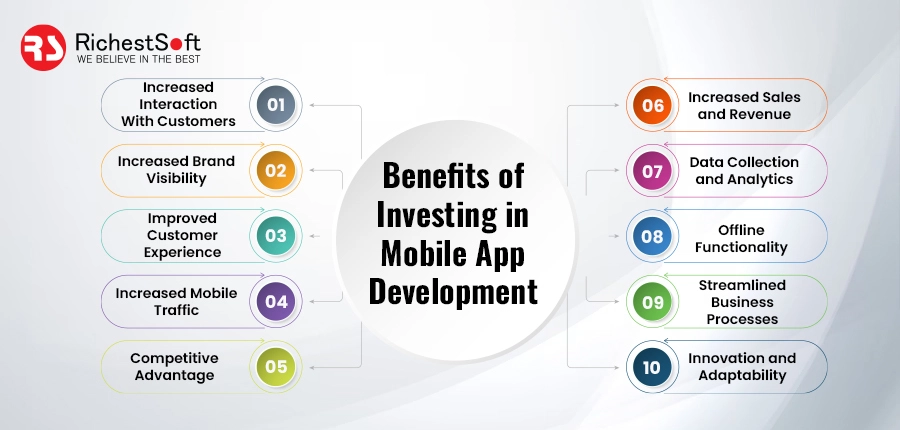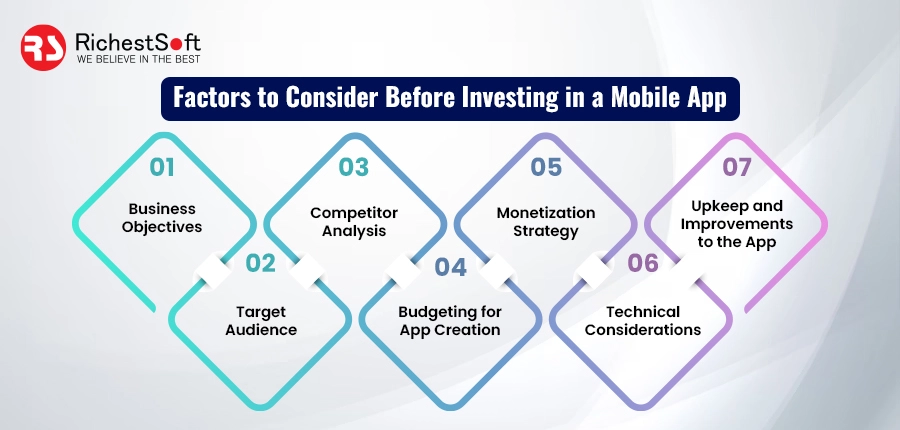Nowadays, businesses can only function with mobile apps. From placing a purchase to scheduling transportation, a smartphone can now do it all. The need for mobile applications spans many sectors due to the proliferation of smartphones. It is increasingly more work for modern businesses to stay competitive by investing in mobile app development. The benefits of mobile app development for organizations are discussed here. Get ready as you learn how an app can completely alter the course of your company!
Introduction to Mobile App Development
Mobile app development refers to creating applications for usage on mobile devices. App creation businesses have expanded with the mobile device market.
Mobile applications are among today’s most widespread software uses. It is because they allow you to access your stuff and do tasks quickly and easily.
With an expected 2.87 billion global smartphone users by 2023, businesses can benefit from a vast market by developing mobile apps.
Benefits of Investing in Mobile App Development

An individual or business might gain numerous advantages by spending money on mobile app creation. A few of the benefits are as follows:-
✅Increased Interaction With Customers:
Mobile apps provide more direct communication between a company and its clientele. Push notifications, individualized promotions, and in-app messaging increase business-customer interaction. Having a one-on-one conversation with a business can boost consumer satisfaction and loyalty.
✅Increased Brand Visibility:
The availability of a branded mobile app can do wonders for a company’s profile. The app can be shared with millions by being featured in app stores. The presence of app icons on users’ home screens also reinforces the brand, boosting recognition and awareness.
✅Improved Customer Experience:
Mobile apps’ convenience and ease of use is undeniable. They can be adapted to the individual demands of each user by providing them with unique information, suggestions, and capabilities. Apps can boost client happiness and loyalty by providing a more pleasant and hassle-free experience.
✅Increased Mobile Traffic:
As smartphones become more popular, consumers abandon desktop computers in favor of mobile devices. Developing a mobile app for your business can increase brand exposure and income.
✅Competitive Advantage:
Creating a successful mobile app can give a company a competitive advantage in the market. It exemplifies cutting-edge innovation and a dedication to satisfying customers. A superior app can set a company apart and win over more users.
✅Increased Sales and Revenue:

The potential of a mobile app to generate revenue should not be disregarded. Due to convenience, mobile app shoppers buy more. In-app purchases, subscriptions, and advertising can make apps profitable.
✅Data Collection and Analytics:
Information about how people use, interact with, and favor mobile apps is beneficial. Companies may better understand consumer behavior, tastes, and concerns. These discoveries can fuel well-considered choices and enhance advertising and product development.
✅Offline Functionality:
Unlike websites, mobile apps can be used without an active data connection. The program still provides some functionality and data even if the user is offline. In areas with patchy Internet connectivity or when traveling, this offline option can significantly enhance the user experience.
✅Streamlined Business Processes:
Business productivity can be improved by using mobile apps to streamline internal procedures. Simplifying processes, including project management, teamwork, stock control, and CRM, can save time and money.
✅Innovation and Adaptability:
Businesses may test out new concepts and strategies on the go with the help of mobile apps. They can refine and improve the app in response to user suggestions and shifting market conditions. Businesses of all sizes need flexibility more than ever to react to the quickly changing digital landscape.
Designing a mobile app wastes time and money without a target audience and company goals. It may help businesses thrive in the mobile-first era and generate significant returns on investment if done correctly.
Factors to Consider Before Investing in a Mobile App

Several considerations need to be made before investing money into a mobile app. Important factors include the following:
👉Business Objectives:
List how a mobile app could assist your company in success. First, you need to find out what issues or needs your target audience has an app may address.
👉Target Audience:
Find out what tastes, routines, and mobile habits your intended audience has. Think about their age, income, iOS/Android preference, and what they hope to get from the finished product. This data will help you better cater the app’s features, design, and function to your target audience.
👉Competitor Analysis:
Evaluate the competition by discovering as much as possible about their mobile apps. You can compete more successfully against them if you know their strengths and weaknesses. With this knowledge, you can make your app more noticeable by highlighting its most vital points and giving users a better overall experience.
👉Budgeting for App Creation:
Estimate the total cost of making a mobile app, from brainstorming to launching. Complexity, user requests, and development methods (native, hybrid, or cross-platform) will affect the app’s cost. Ensure your app development costs match its time, effort, and revenue.
👉Monetization Strategy:
Consider your options for making money off of your app. Is it possible to make money from this app? Perhaps adverts, subscriptions, or in-app purchases. Consider the merits and drawbacks of your proposed monetization strategy and potential revenue streams.
👉Technical Considerations:
1. Understand the tools, languages, and frameworks that enable app development.
2. Examine your solution’s scalability, performance, security, and interoperability with current infrastructure and APIs.
3. Consider whether you must purchase servers to store your data and backups.
User Experience and Design: The success of an app mostly depends on the quality of the user experience it provides. Spend effort making an attractive, easy-to-read layout. To guarantee your app is helpful to its intended users, you should study them, seek their feedback, and put it through usability testing.
👉Upkeep and Improvements to the App:

Consider how the app will need to be maintained and updated. Operating systems require upgrades, testing, problem patches, and feature additions. Consider the time, money, and energy that need to keep the app updated and working smoothly.
App Marketing and Promotion

1. You will need a plan to spread awareness of your app and encourage more people to download it.
2. Consider app store optimization (ASO), social networking, and online advertising as you plot out your app’s promotion strategy.
3. Create a app marketing plan and budget to keep pushing people to download and use your app.
Analytics and Measurement
1. Think about the metrics indicating your mobile app is successful.
2. Establish metrics such as downloads, user interaction, retention, and revenue to measure success.
3. Incorporate analytics tools to monitor user actions, discover problem areas, and optimize the app based on complex data.
By carefully considering the above concerns, you can make decisions that lay the foundation for a profitable mobile app investment that helps you achieve your business goals, attracts your ideal customers, and provides them with a satisfying app experience.
FAQs
Q1: What impact can a mobile app have on customer engagement?
Ans: Apps for mobile devices allow businesses to have a more personal and direct dialogue with their clientele. Apps can boost user loyalty and pleasure by incorporating real-time features such as push alerts, personalized offers, and in-app messaging. By delivering more customized content, responding to comments, and streamlining the app’s layout, apps can help businesses engage with customers.
Q2: How does a mobile app contribute to brand visibility?
Ans: Your company’s exposure needs to boost with the help of a mobile app. You may reach a massive audience by distributing your app through app stores. In addition, consumers will be reminded of your company whenever they see your app’s symbol. The easier people encounter and learn about your brand, the higher the likelihood they will become new consumers.
Q3: Can a mobile app increase sales and revenue?
Ans: Mobile apps can be excellent money-makers for businesses. Due to e-commerce apps’ convenience, users are more inclined to make purchases. Monetization strategies – in-app purchases, subscriptions, and advertising can be incorporated into apps to increase earnings. Apps can increase engagement and income by providing a streamlined user experience and tailored content.
Q4: In what ways may a mobile app facilitate information gathering and analysis?
Ans: Information about people’s habits, preferences, and app usage is essential. By gaining insight into consumers’ tastes, routines, and concerns, businesses can better serve them. This data can improve business decisions, advertising strategies, and product quality. You may monitor your app’s success by monitoring and tracking several key performance indicators (KPIs) with the help of mobile app analytics.
Q5: What competitive advantages can a mobile app offer my business?
Ans: Your brand may stand out from the crowd with the help of a sophisticated mobile app. It exemplifies great innovation and a dedication to satisfying customers. Your app’s superior design, personalization, and accessibility will bring in new users and keep your existing ones happy.
Conclusion
To expand your audience and boost sales, consider mobile app development. High-quality apps must be invested in a mobile-first era to give a great user experience and stay competitive. The numerous benefits of developing a custom mobile app include increased brand awareness and financial returns. Making a unique mobile app could be the missing link in expanding your business.
 +1 315 210 4488
+1 315 210 4488 +91 798 618 8377
+91 798 618 8377


